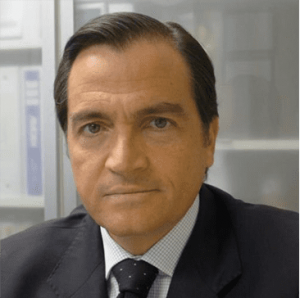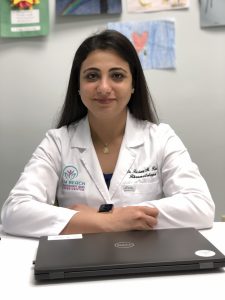When Reshma Khan, MD, a rheumatologist with the Palm Beach Rheumatology and Wellness Center, Jupiter, Fla., relocated from Michigan four years ago, she wanted to connect with other rheumatologists in the area. Through the Florida Society of Rheumatology (FSR), she’s met many colleagues.
The FSR is one of the oldest and largest rheumatology associations in the U.S. and holds the largest annual state association meeting, according to Guillermo Valenzuela, MD, a rheumatologist with Integral Rheumatology and Immunology Specialists, Plantation, Fla. Dr. Valenzuela is serving his second year as the society’s president.

Dr. Guillermo Valenzuela
“We have approximately 276 members and have been in existence for over 25 years,” Dr. Valenzuela says. “Our membership [comprises] rheumatologists, physician assistants and nurse practitioners.”
Patient access to medication and services is one of the issues the FSR is currently working to address.
“One of the biggest barriers for patients in Florida is obtaining a referral and gaining access to a rheumatologist,” Dr. Valenzuela says. “Patients may present with symptoms of inflammatory back pain, but aren’t referred to a rheumatologist. There’s a lack of knowledge about rheumatic diseases, such as ankylosing spondylitis and others, and this can delay treatment for patients.”
The FSR also holds an annual advocacy day during the state legislation season, during which members can travel to the Florida capitol, meet with legislators and educate them about some of the biggest issues facing healthcare providers and patients in the state.
“It’s been a privilege to serve as president of the Florida Society of Rheumatology, and to advocate for many issues that would be beneficial to our patients,” Dr. Valenzuela says. “Though Florida has been slow to reel in the predatory actions of pharmacy benefit managers (PBMs), the FSR has made it a priority to educate policy makers in Florida [about] how such practices negatively impact our patients.”
Although several bills, such as HB 373, which would have reformed Florida’s current step therapy protocols, died in the recent Florida legislative session, Dr. Valenzuela says the FSR will continue to advocate for step therapy reform and other issues affecting patients as they look toward the November elections.
Regarding step therapy, Dr. Valenzuela says, “If a patient is medically stable on a drug, the patient and doctor should receive a 60-day notice [in which] a decision can be made if the switch will be detrimental to the patient’s health or if the new drug would also control the patient’s disease state as effectively. If a change would be detrimental, the FSR believes the patient should be allowed to stay on [the prescribed] drug for the remainder of the insurance plan year, and then at that time a patient could once again shop during open enrollment for the best plan with the best drug coverage for their needs.”
He notes that Medicare already requires this, as does the State Group Health Insurance. He says this protection should be provided to all of Florida’s patients.
The FSR also hopes to see changes made in how patients pay their share of a drug’s cost. “Florida law does not protect the patient and pass down the savings PBMs receive in purchasing a drug,” Dr. Valenzuela says. “Many Floridians are shocked to discover we are all paying copays, deductibles and co-insurance based on the high list price of the drug.” The FSR advocates that patients pay out-of-pocket expenses based on the lower, negotiated price of the drug, thus lowering the price of the drug for Floridians instantly.
Attracting More Physicians to Rheumatology
The FSR is also looking at ways to combat the looming physician shortage. According to Florida Department of Health’s 2019 Physician Workforce Annual Report, 12.5% (or 6,633) of the state’s physicians reported they were planning to retire within the next five years.1
At the society’s meeting in August 2019, Dr. Valenzuela notes that Angus B. Worthing, MD, a rheumatologist in Chevy Chase, Md., and then-chair of the ACR’s Government Affairs Committee, spoke to members of the FSR about how state and federal sources are working to address the workforce gap in rheumatology.
Dr. Worthing encouraged those concerned about workforce issues to consider investing in the Rheumatology Research Foundation, which supports rheumatology fellowships. He also discussed a proposed loan repayment plan for those who agree to work at least two years in pediatric medicine.
Currently, there’s a nationwide shortage of pediatric rheumatologists. According to the ACR, fewer than 350 board-certified pediatric rheumatologists are practicing nationwide.2
In an effort to increase the number of pediatric rheumatologists, the University of Florida Health also launched the state’s first fellowship program in pediatric rheumatology in 2014.
Dr. Valenzuela says the FSR is working to increase the number of rheumatologists practicing in Florida by establishing its own residency program.
“We hope to educate and motivate medical residents to consider a career in rheumatology,” he says. “We plan to run the program on a yearly basis and offer residents a taste of what it’s like to work in the rheumatology field.”
In addition, FSR members can encourage nurse practitioners (NPs) and physician assistants (PAs) who are interested in pursuing a career in rheumatology to use the online education tool developed and offered by the ARP. Dr. Valenzuela notes that although specialty training is required for rheumatologists, NPs and PAs aren’t required to pursue postgraduate programs after completing generalist, primary care-focused training. Online training can also be helpful for rheumatologists who want to add an NP or PA to their practice.
Dr. Valenzuela says medical residents and fellows are invited to attend the FSR’s annual meeting, held each year in Orlando, a destination that holds appeal for both physicians and their families, who often extend their stay to enjoy the perks of nearby Disney World. This year’s conference is currently scheduled to take place Aug. 28–30 at the Orlando World Center Marriott.

Dr. Reshma Khan
Feeling the Effects of Climate Change
Dr. Khan, who also founded and moderates a Facebook group for women rheumatologists, notes that rheumatologists in the FSR are also acutely aware of climate change and the effects that Florida’s increased heat and humidity will have on patients. Higher temperatures, rainfall and standing water are already bringing about the rise of mosquito-borne diseases, such as dengue, zika and chikungunya in Florida.3,4
“These are diseases I learned about while studying for my medical degree in India,” Dr. Khan says. “While some of these mosquito-borne illnesses are common in India, it used to be rare to see cases in Florida.”
Dr. Khan says chikungunya, in particular, should be on the radar of internists and rheumatologists, because the virus often causes debilitating arthritis symptoms. The virus has been reported in people who have traveled to Caribbean and Central America. The first case of non-travel-related chikungunya was reported in Florida in 2014 in a couple who had not recently traveled. Between 2014 and 2016, more than 3,800 cases of chikungunya occurred in Florida.5
Linda Childers is a health writer located in the San Francisco Bay Area.
References
- Florida Department of Health. 2019 Physician Workforce Annual Report. 2019 Nov.
- ACR news release. Capitol Hill briefing to address national shortage of pediatric rheumatologists and impact on children and U.S. healthcare system. 2015 Oct 2.
- Pullen L. Why rheumatologists should care about zika: How it’s transmitted and spread in the U.S. The Rheumatologist. 2016 Sep 26.
- Holliman K. Mosquito-borne chikungunya virus can cause long-term arthritis. The Rheumatologist. 2018 Sep 28.
- Buck B. Can Florida mosquitos transmit new strains of painful chikungunya virus? University of Florida blog. 2017 Jul 27.


